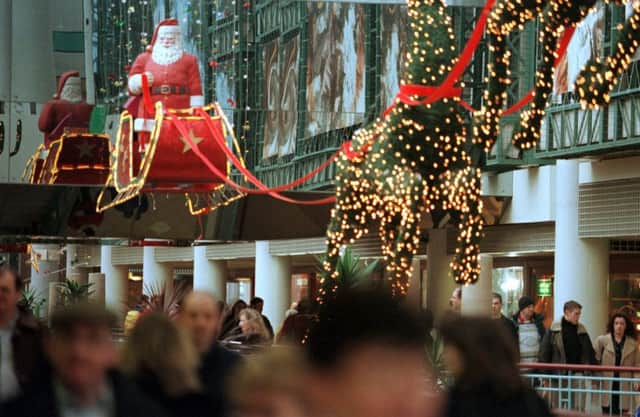Two in three shops begin sales before Christmas


A report by PricewaterhouseCoopers (PwC) found that 65 per cent of stores were promoting sales or multi-buy discounts last week – seven per cent more than in the previous week.
However, the number is not as high as the same time in 2008, when 85 per cent of recession-hit retailers ramped up discounts ahead of Christmas.
Advertisement
Hide AdAdvertisement
Hide AdOnline shopping for gifts began in earnest on “Cyber Monday”, 2 December, when bargain hunters turned to the internet. Online retailer Amazon reported the busiest day of the year, racking up 4.1 million sales in 24 hours, with purchases via smartphones or tablets nearly doubling compared to last year.
Some UK stores followed US counterparts by heavily discounting goods from the previous Friday – known across the Atlantic as “Black Friday”, due to the flood of shoppers expected the day after Thanksgiving.
“So-called Cyber Monday may have seen a peak in online sales, but it seems most retailers are now realising that for shoppers, it’s all just one marketplace,” said Caroline Roxburgh, head of private business at PwC in Scotland.
“That means stores have to enter into the online festive discounting spirit, as shown by the UK’s take on Black Friday, when one store group alone sold 10,000 televisions in an hour.” Asda, which is owned by US retail giant Wal-Mart, said it sold 166 TVs every second during one hour of trading on Black Friday, while the heavy discounting sparked a fight in one store.
The PwC report said more retailers could turn to discounting in the run-up to Christmas.
“As expected, and in line with previous years, the proportion of stores with advertised sales increased to 62 per cent this week,” said Ms Roxburgh.
“We expect the traditional annual game of ‘chicken’ between consumers and retailers to play out for another week or more.”
Average price discounts advertised last week were 39 per cent, according to the PwC report, compared to 36 per cent in the same week in 2012 and 45 per cent in 2008, when the economic crisis was at its peak.
Advertisement
Hide AdAdvertisement
Hide AdLeigh Sparks, professor of retail studies at the University of Stirling, said retailers had been forced to change their habits due to uncertainty in consumer confidence and competition from online stores.
“Online has changed Christmas shopping, but the recession has changed it as well,” he said.
“What is most interesting is the comparison with 2008, when retailers were massively overstocked. The financial crisis had hit and they had to get rid of as much as possible. Now, that uncertainty remains: they don’t know how much people have to spend.
“That has been exacerbated by the internet. The post-Christmas, Boxing Day sale still happens, but retailers can no longer rely on cashing in on pre-Christmas shopping, so have to look at discounting earlier.”